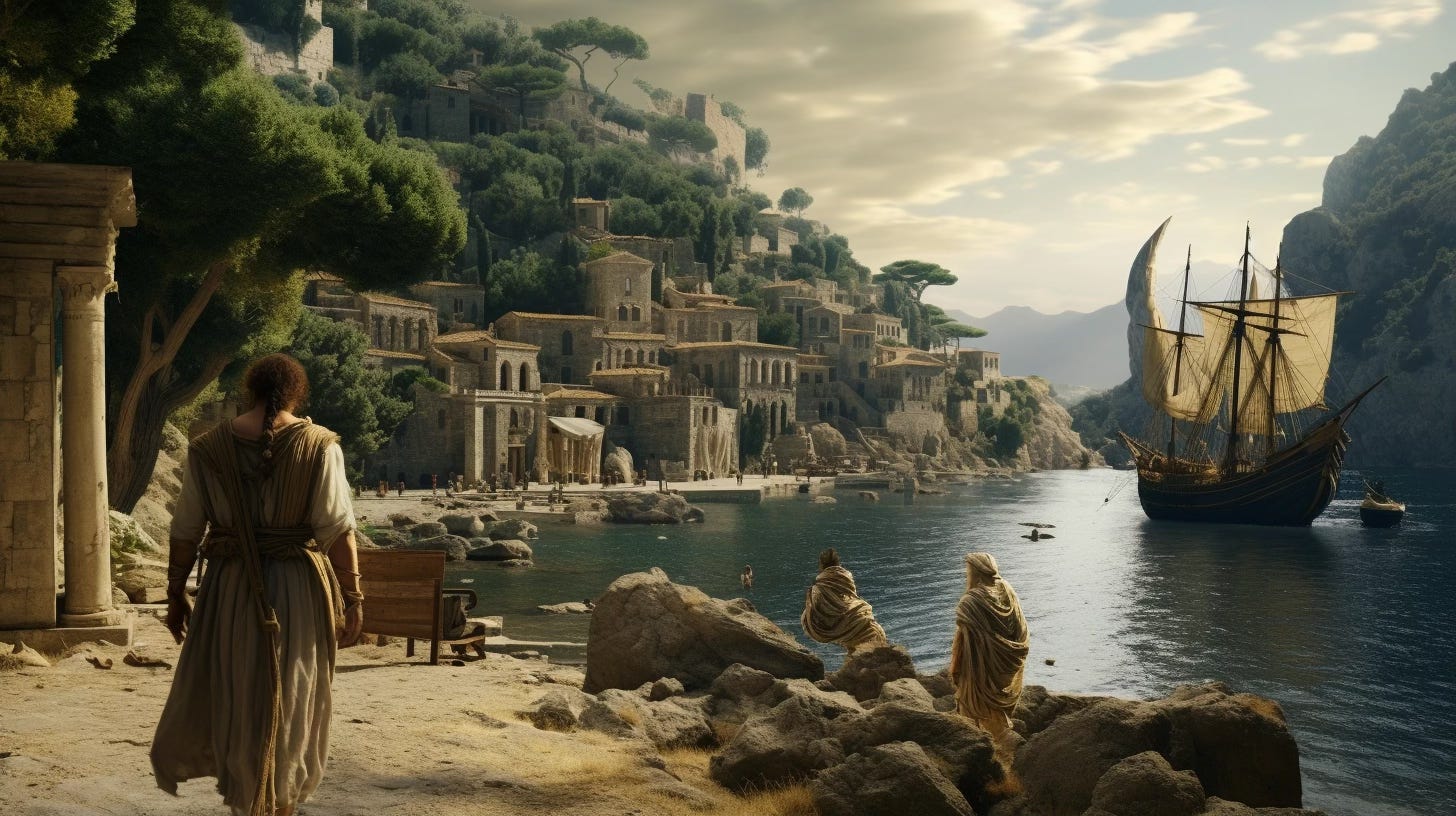The first part of The Iliad foretold much of what transpired throughout the epic. In similar form, the first two sections of The Odyssey (lines 1-25) set the stage for the ensuing return of Odysseus. A few themes become immediately apparent. Odysseus is no ordinary man. Emily Wilson calls him a “complicated man” while Robert Fagles describes him as a man of “twists and turns.” Wrath was The Iliad’s first word. Man is The Odyssey’s first word.
Yet, both of these terms are present in both epics. The “man” in The Iliad is Achilles; Odysseus in The Odyssey. The wrath that sets much of The Iliad’s narrative originates in Achilles while Poseidon’s wrath against Odysseus sets the stage for the difficult 10-year journey home in The Odyssey. While nearly all of the gods are on Odysseus’ side, Poseidon is upset with Odysseus because of what he did to his cyclops son Polyphemus:
And now for his blinded son the earthquake god— though he won’t quite kill Odysseus— drives him far off course from native land.
After this brief overview of what will transpire with Odysseus, Homer immediately shifts the focus away from Odysseus onto his son Telemachus, who will consume books 1-4.
Homer then introduces a major theme for the epic – the idea of hospitality. Athena shows up at the estate of Odysseus, currently occupied by Penelope, Telemachus, a gaggle of suitors, and a variety of slaves. Athena takes the form of Mentes, whom Fagles calls a “stranger” and Wilson translates as a “guest-friend.” The guest-friend was an important idea in The Iliad, forming bonds that could even surpass the passion of war. The way in which Telemachus treats this god in disguise will be one of his first big tests.
Telemachus passes this hospitality test and Athena encourages Telemachus to take a trip to learn about the fate of his father. This also gives Telemachus the chance to venture out on his own and to begin to assert his independence. If Telemachus learns that his father is still alive, he is to wait for his return to enact vengeance against the suitors. If his father is dead, he is to consider immediate vengeance before the suitors consume all of the household wealth.
Homer also introduces Penelope, the wife of Odysseus. While Odysseus is full of “twists and turns,” his faithful wife is also a shrewd woman, tricking the suitors and keeping them guessing.
In book 3, the story of Agamemnon’s return from Troy is told. This will set up one of the many character comparisons that will enhance the epic. In Agamemnon, there is a ready comparison to Odysseus, one between Clymenstra (Agamemnon’s wife) and Penelope, Orestes (his son) and Telemachus, and Aegisthus (Clymenstra’s lover) and the suitors.
Telemachus’ journey concludes with a mixed bag of results. He learns little new about the fate of his father, hears the stories of others, and is now in a position of great danger with the suitors planning an ambush upon his return. It’s a brilliant bit of storytelling to introduce Odysseus at the beginning and leave the audience in suspense for the first four books while focusing on the action taking place at the destination of Odysseus’ journey.
—
Note: The Adjectives of Odysseus
One idea I plan to focus on during this reading is in the adjectives used to describe the “man” Odysseus. I don’t like Emily Wilson’s “complicated man.” Complicated has a negative connotation for me when attached to a person. A complicated person is one who is hard to get along with, or one who has so many problems that drama will consume his or her life. I don’t get that sense with Odysseus. Shrewd, complex, cunning perhaps, but not complicated. Or at least not complicated as the main adjective. Odysseus encompasses so much more. Perhaps Emily Wilson is sharing a moral observation in describing him in a negative light while the epic presents these cunning ways in a more nuanced light.
Fagles’ “man of twists and turns” also doesn’t capture Odysseus for me. That wording describes more of the action around Odysseus, the challenges he faces, instead of being a description about the man himself.
I plan to write down adjectives I think best describe Odysseus as I read through the epic.




